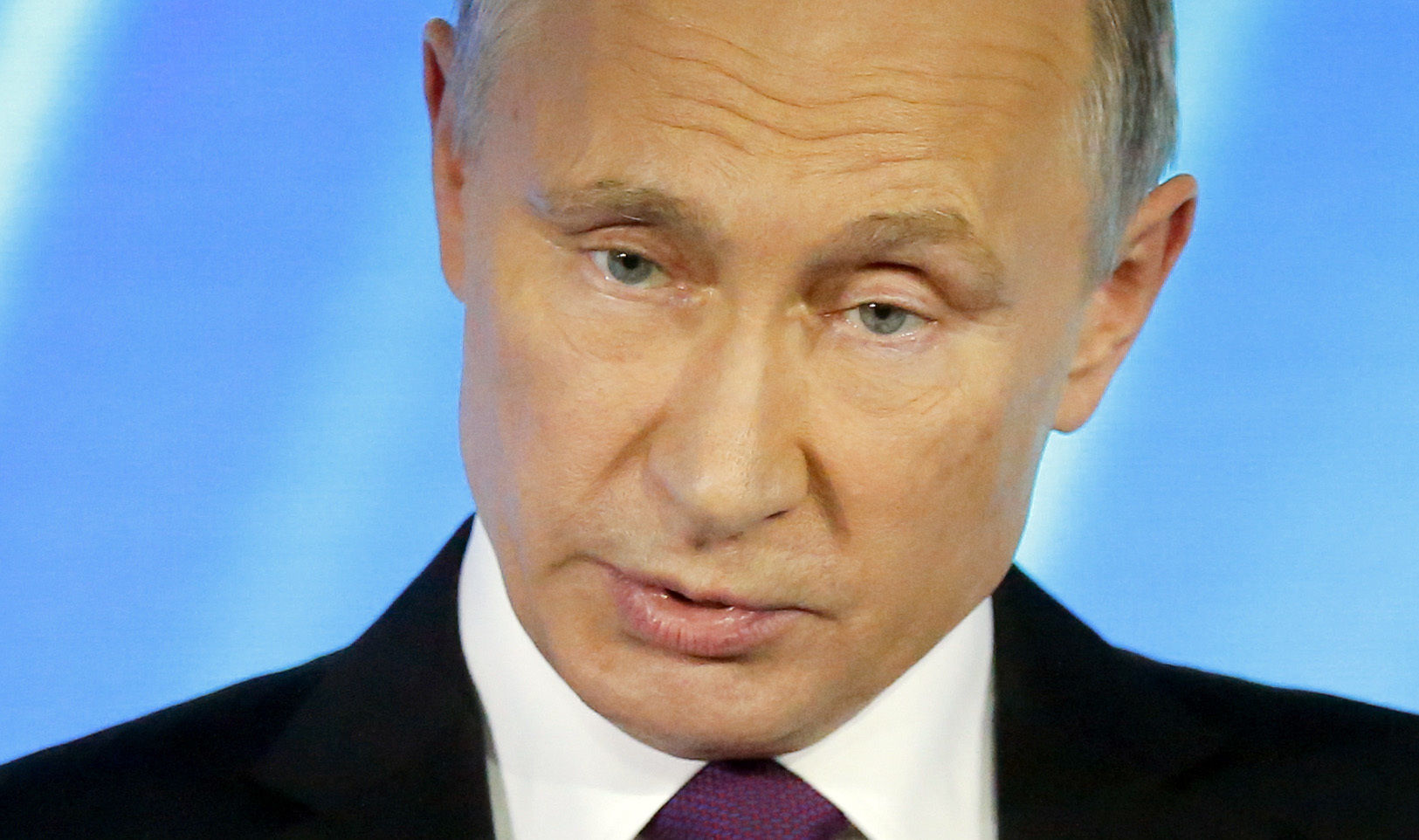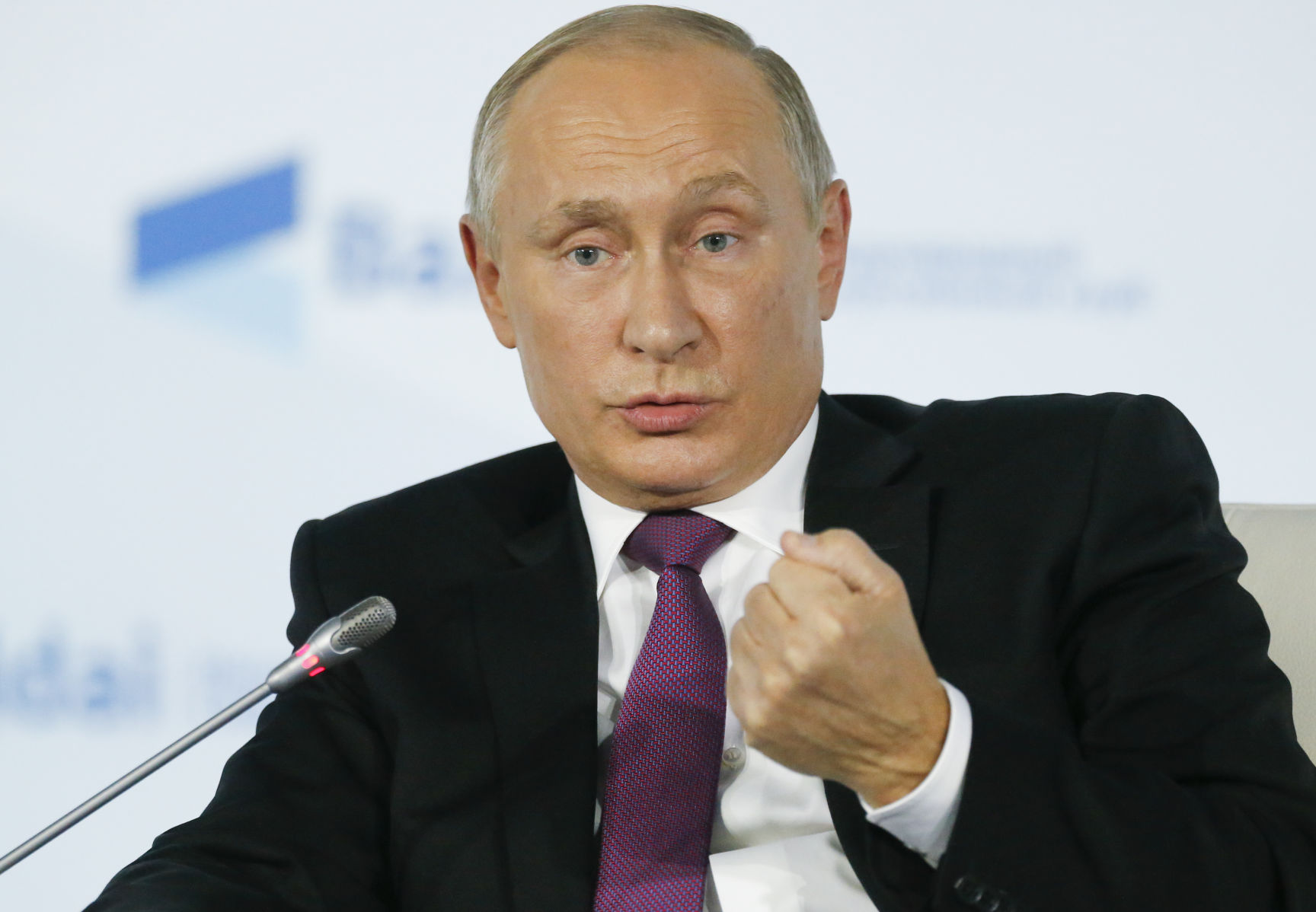MOSCOW (AP) — President Vladimir Putin said Thursday that Russia remains open to cooperation with Washington even though President Donald Trump’s political foes in the U.S. have tried to prevent him from fulfilling his campaign promises. Asked at a forum
MOSCOW (AP) — President Vladimir Putin said Thursday that Russia remains open to cooperation with Washington even though President Donald Trump’s political foes in the U.S. have tried to prevent him from fulfilling his campaign promises.
Asked at a forum of foreign policy experts if Russia is annoyed with Trump’s unpredictability, Putin said that it’s linked to a “strong resistance inside the country.”
Russia rejoiced at Trump’s victory in the 2016 U.S. election, but its hopes for repairing ties with his administration have been shattered by congressional and FBI investigations into the Trump campaign’s ties with Russia.
Speaking at the Valdai forum in Sochi, Putin said Trump’s political adversaries “haven’t allowed him to fulfill any of his election platforms and plans.”
He emphasized that Trump won an honest victory thanks to his talents, adding that the lack of respect for Trump and his voters shown by his foes is a “deplorable element of the U.S. political system.”
At the same time, he added that Russia will remain open to cooperate with the United States.
U.S. intelligence agencies say that Russia interfered in the 2016 U.S. presidential election. Russia denies the charge.
“An unprecedented anti-Russian campaign has been unleashed in the United States,” Putin said. “After losing the election to Trump, they have put all the blame on Russia and engaged in a frenzied anti-Russian hysteria.”
He warned that Russia will “momentarily respond quid pro quo” if Washington imposes restrictions on the Russian state-funded RT television network and Sputnik news agency.
RT has said it faces a U.S. demand to register as a foreign agent and provide detailed personal data for its staff. It says the request amounts to an attempt to push it out of the U.S. media market.
Putin also criticized the U.S. and its allies for missing a chance to build a safer and more stable world after the Cold War and engaging in what he described a “policy based on arrogance, egoism and claims of exclusivity.”
He pointed at Russia’s “unprecedented openness” in allowing the U.S. to inspect and monitor its nuclear weapons facilities after the 1991 Soviet breakup, adding that Moscow has received little in return.
“We made a mistake in trusting you too much,” he said answering a question about what he thinks was Moscow’s mistake in relations with the West after the end of Cold War. “And you have mistaken that trust for weakness, and abused our trust.”
The Russian leader noted that the U.S. has been slow to dismantle its chemical weapons arsenals in line with an international treaty, while Russia last month wrapped up the destruction of its chemical weapons stockpiles.
He said Russia will stick to its obligations under the 1987 Intermediate-range Nuclear Forces Treaty and will continue to do so. U.S. officials have accused Russia of developing missiles in violation of the treaty, a charge Russia has denied.
Putin said the 1987 accord was tilted in the U.S.’s favor, effectively amounting to “unilateral disarmament,” as it failed to ban missiles carried by navy ships and aircraft that the U.S. had and the Soviet Union didn’t.
He said Russia has since developed such cruise missiles for its navy and air force.
Asked if he views a global ban on nuclear weapons as a realistic possibility, Putin answered affirmatively. He said Russia would “want it and will be striving to achieve that.”
The Russian president noted that new precision weapons now under development could be just as devastating as nuclear weapons. He said Russia is also working on such weapons.
The comments contrast with earlier statements by Putin and other Russian leaders, who have said that a global ban on nuclear weapons is unrealistic.
While condemning Pyongyang’s nuclear ambitions, Putin said the standoff should be settled through dialogue, without “cornering North Korea, threatening to use force or going down to outright boorishness and swearing.”
He added any U.S. hopes to quickly knock down all of North Korea’s nuclear weapons sites are unrealistic, saying the U.S. “will never find out all their caches.”




